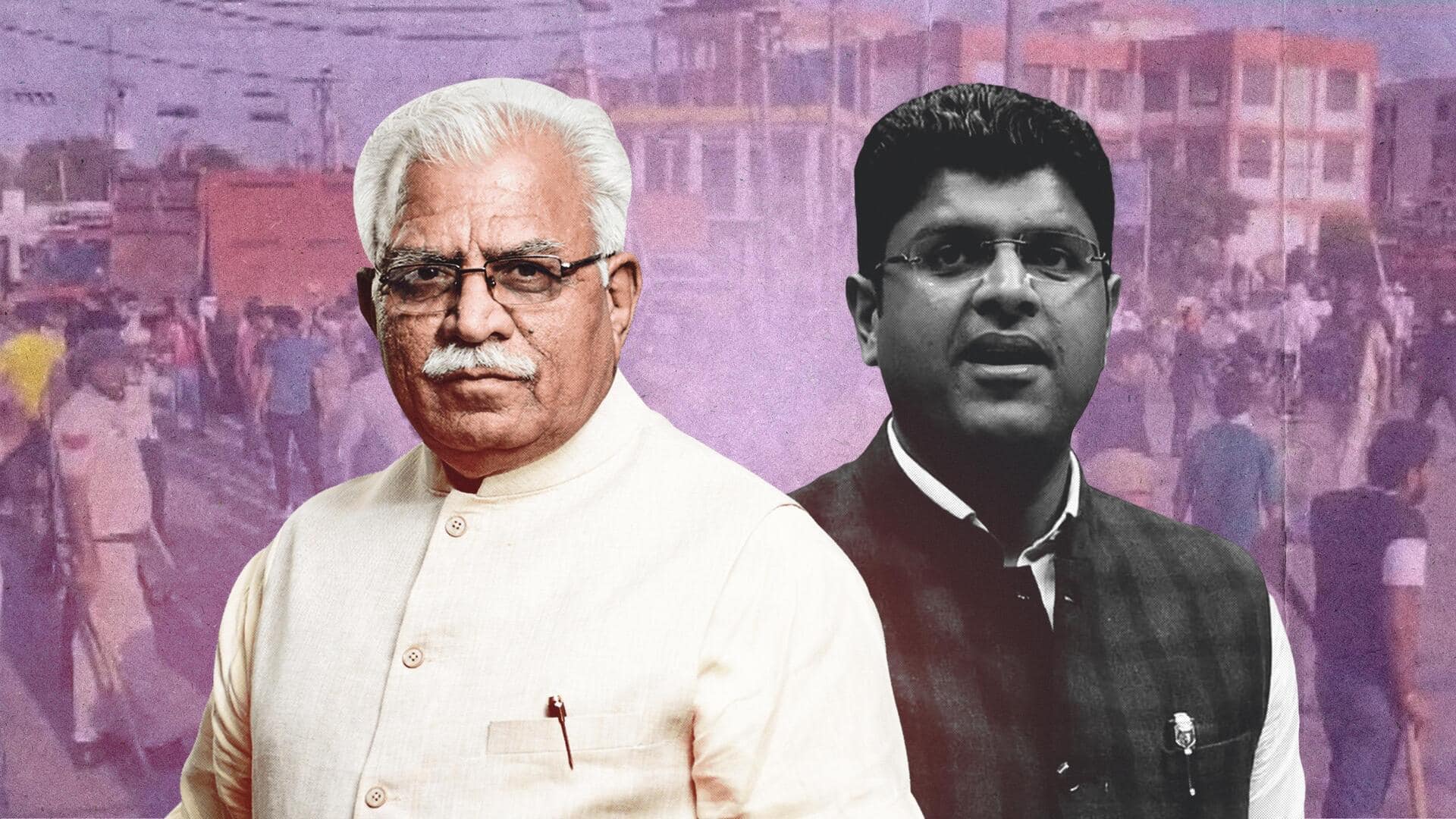
Haryana violence: Why CM, Deputy CM are contradicting each other
What's the story
After two days of communal riots in Haryana following a rally by the Vishwa Hindu Parishad (VHP) and Bajrang Dal, the administration and government are reportedly acting against the perpetrators of the violence while appealing to citizens to maintain peace. However, contradictory statements by Chief Minister Manohar Lal Khattar and Deputy CM Dushyant Singh Chautala have left people guessing.
Context
Why does this story matter?
Haryana will go to the polls next year. While Khattar is a BJP stalwart, Chautala leads the Jannayak Janta Party (JJP). After falling short of the majority mark in the previous election in 2019, the BJP entered an uncomfortable coalition with the JJP to form the government. However, recently, the rift between the BJP and the JJP has reportedly widened.
Statement
Chautala pinned blame on rally's organizers, Khattar alleged conspiracy
On Tuesday, Chautala said the violence could have been averted if the organizers had given "proper estimates" of the rally's participants to the administration. Meanwhile, Khattar suspected a "big conspiracy" behind the attacks on the participants of the rally and the police. His statement is being perceived as pandering to the right-wing groups that organized the rally.
Rift
BJP allegedly eyeing southern Haryana, JJP Mewat's 3 seats
In recent months, speculations have been rife about the BJP sidelining the JJP so as to ensure that the latter fights independently and cuts into the Congress's votes, thus clearing the way for the BJP. Social media users alleged the BJP is eyeing 21 seats in southern Haryana by banking on communal polarization, while the JJP is targeting three seats in the Mewat region.
2019
What was the report card of 2019 elections?
In the 2019 elections, the BJP emerged as the front-runner by winning 40 out of 90 seats, followed by the Congress with 31 and the JJP with 10. While it fell short of the majority mark of 46, seven independent MLAs vowed to support it. To avoid a flimsy ground, the BJP joined hands with the JJP by promising Chautala the Deputy CM's post.
Voter base
JJP's voter base called alliance with BJP 'betrayal'
However, the JJP's allying with the BJP left its core voter base, Jat farmers, furious as it fought the election on an anti-BJP plank and also approached the Congress for a pre-poll alliance but was snubbed. Jats accused Chautala of "betrayal," The Hindu reported in October 2019, and pressured the party to pull out of the coalition during the farmers' agitation in December 2020.
Jats
Jats form over 25% of Haryana's population
The Jats form over a quarter of Haryana's population and have dominated Haryana's politics since its formation in 1966. It has had 33 Jat CMs in its 57-year existence. Bhajan Lal Bishnoi and Khattar are the only non-Jat CMs with long tenures. But the 2016 police firing during the Jat reservation agitation under the BJP's rule—which killed 20 youths—turned Jats against the party.
2018
Chautala formed JJP in 2018
Chautala and his father, Ajay Singh Chautala, founded the JJP in December 2018 after breaking away from its parent, the Indian National Lok Dal (INLD). It was founded by the Deputy CM's great-grandfather and former Deputy PM Chaudhary Devi Lal in 1996. The Jats, mostly farmers, have been angry with the BJP for not doing enough and failing to implement the Swaminathan Commission's recommendation.
Report
What is the Swaminathan Report
The Swaminathan Report is a compilation of the five reports submitted by the National Commission on Farmers between December 2004-October 2006. Headed by Professor Ms Swaminathan, the report includes major recommendations and findings on farmer competitiveness, agricultural productivity, food security, credit, and insurance. One of the commission's recommendations was that MSP should be at least 50% more than the weighted average cost of production.
2014
BJP registered first significant victory in Haryana in 2014
The BJP was a marginal player in Haryana until 2014, when it won 47 seats. Prior to this, it saw double-digit performance only in 1996. Lokniti's analysis of the 2014 election showed the BJP's success was based on the consolidation of upper castes and OBCs, while its vote share among Jats was 17%. In 2019, it mobilized all castes, prompted by the Pulwama attack.